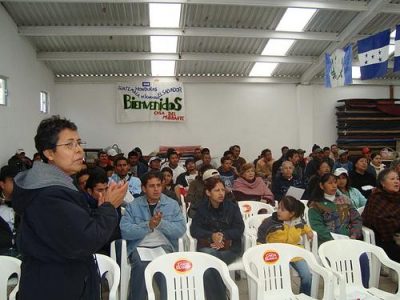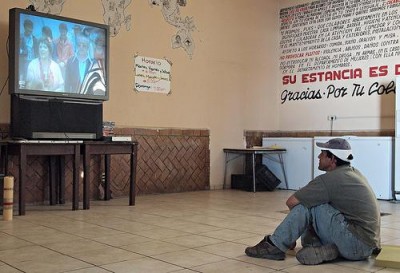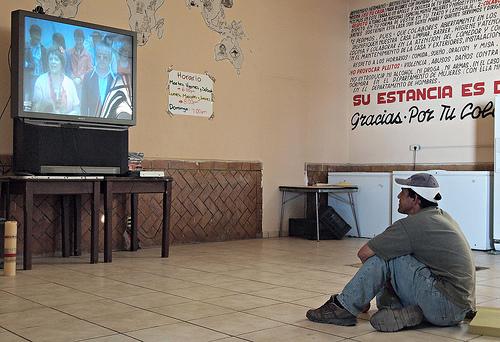This year, the Letelier-Moffitt international award will be presented to Belén, Posada Del Migrante (Bethlehem, the Migrant’s Shelter), a migrant shelter based in Saltillo, Coahuila, Mexico that provides humanitarian assistance to migrants in transit and works to protect them from kidnapping, extortion, sexual abuse, and murder. As a voice for the human rights of migrants in transit, it has courageously worked to document abuses against migrants and denounce human rights violations of migrants by Mexican officials.
But no stranger had to spend the night in the street, for my door was always open to the traveler.
Job 31, 32
Eleven Years of Violence and Persecution, Against the Odds: The blood and deaths of migrants, and the seeds of hope.
The Year 2000

Migrants prepare for an orientation at Belen, Posada del Migrante. Photo by Humanidad sin Fronteras.
Nevertheless, the migrants, beaten men and women — who were dirty and dispossessed when they entered the city’s outskirts — just said; “We’re hungry and we’re tired and we have been beaten!” This underscored one of the most beautiful and evangelical traditions that prevails in our community: take our bread and share it! Whenever a migrant arrives, at midnight, in the early morning, at dawn, or in the heat of the day, there will always be a group who will take him or her in, that will say: “It doesn’t matter what time it is, you’re going to sit down at our table, share our bread, and then go rest.”
2001: The Criminalization of Aiding Migrants Sets in and the Murders Begin
Criminal charges were increasingly brought against us for aiding migrants. “Conservative Christian” groups considered it “sinful” to give the refugees shelter, because they were supposedly arriving “illegally,” which made them “illegal” too. There were even people who were happy when they died, saying “they deserved it for having come here.”
The wave of migration gave way to murder and spilled blood. Delmer, Alexander, and David, all Hondurans, were murdered by bullets, as they slept. Ismael Cruz was stoned to death by security guards on the train.
We were bloodstained when we retrieved the bodies, but this act planted the seeds of hope. It gave us the courage to persevere.
With the strong backing of our Bishop, Raul Vera, I organized together with three religious women the Bethlehem, the Migrant’s Shelter next to the train tracks.
Frontera con Justicia y Humanidad Sin Fronteras
(These are two non-profit organizations whose names translate as “Bordering Justice” and “Humanity without Borders.” They provide the migrants who have sought shelter in Saltillo with legal and counseling support.)
Obstacles and Challenges

Mariano, a migrant from Honduras, watches television at Belen, Posada del Migrante. Photo by LatinDispatch.
We didn’t want to only focus on organizing a shelter. Instead, we addressed the overall issue of migration as a social and historical phenomenon that today runs through history, society, the fabric of society and the Church itself.
We didn’t want to treat migrants simply as victims, but instead as a new kind of emerging heroes, and beacons of hope.
This is why we formed two organizations: Frontera con Justicia and Humanidad sin Fronteras to assemble a team of professionals that could offer persecuted migrants not just lodging, food, and health care, but a comprehensive package of services, including legal representation, counseling, and advocacy for laws aimed at protecting their rights.
It was a radical humanitarian endeavor. The migrants who came to our shelter would feel upon arrival that they had left the evils of persecution and aggression behind. Once they’d reached us, they could belong to a movement to build a more humane and liberating society.
The Violence Has Never Ceased
We would have loved to have seen an end to the violence. But to the contrary, it has grown and so have our enemies: organized crime, and the complicity of security forces.
The consequences have been dire: murders, kidnapping, torture, disappearances, rape, and sexual abuse, even the paradigm of anti-migrant cruelty, the massacre of 72 migrants in San Fernando, Tamaulipas in August 2010, and the discovery of 47 other clandestine mass graves with mutilated bodies.
Our Achievements
- More than 50,000 Central American migrants have passed through our shelter.
- In the 11 years of our work, we have made the broader community recognize the pain and suffering that migrants endure.
- We have made progress in political and legal advocacy work in favor of migrants.
- We have traveled abroad to connect with organizations and international bodies in the defense of migrants’ rights.
- We have inaugurated “New Wine in New Casks” with a new Church with new liturgy and ecclesiology that has a migration perspective.
- We have innovated therapeutic humanitarian counseling for migrants who were tortured when they were kidnapped.
The Letelier-Moffitt Award’s Significance
We would like to express our deepest gratitude to the human rights and migrant policy organizations that chose to give us this award. Criminal charges are increasingly being brought against us and we are now under attack more than ever. The levels of risk and insecurity faced by the people defending migrants’ rights are the same as what the migrants themselves experience.
This is an award for courage and a just fight on behalf of people who have to migrate. We are in solidarity with these people. They are our brothers. With that in mind, we receive this award, not as bosses or experts but as fighters in the struggle for human rights.
Father Pedro Pantoja Arreola is the director of Belén, Posada Del Migrante (Bethlehem, the Migrant’s Shelter) and chief adviser for two organizations that provide legal services and other forms of humanitarian support to Central American migrants, Frontera con Justicia (Bordering Justice) and Humanidad sin Fronteras (Humanity without Borders).
Emily Schwartz Greco translated this blog post, which is also available in Spanish on the Institute for Policy Studies website.
